Twilight Sparkle is eager to begin her first officially sanctioned research expedition, but when she and her friends encounter something unexpected in a distant corner of the Everfree forest, they are unprepared for what they find.
The crew of Voyager have been crossing Borg space for weeks. When a long serving crew member leaves them, they find themselves stranded even further from home.
With a soulless enemy bent on the destruction of all they hold dear and an ancient evil rising to take revenge, can the crew of Voyager forge an alliance in time to save Equestria and their ship?
Star Trek Voyager crossover
Some plot elements inspired by VaporingRat's story Friendship Is Futile

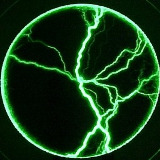

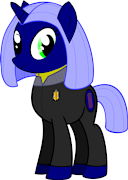


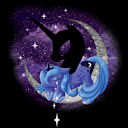
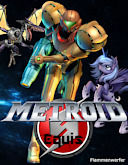
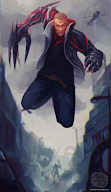

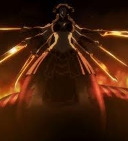
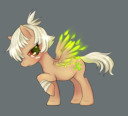


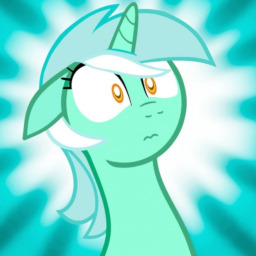

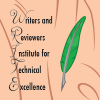
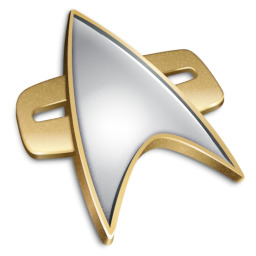
I love this story! Looking forward to more!
Also, sorry if I stole the first comment from you!
Gold paved heavens, but you have pumped out a lot of prose here.
It's not too terribly bad either. One thing I would like to point out: It is alright to use said. Like, in all honesty, you should use said to avoid slipping into "telling" mode by mistake.
But not bad.
Story added to the group, Star Trek Ponies.
This...is....so GOOD.
1589403 I can't really think of a better first comment than that.
I've been working on and off on this since mid July. I Sent the drafts to a friend of mine in mid October for some revisions, but got tired of waiting for him and went ahead and posted it. Almost as soon as it went up, I got an email from him with a bunch of edits. So I guess there's still some work to be done.
Still trying to get a feel for what works and what doesn't, but I intend to press on.
This is much better than I was expecting, and I am very excited to read more!
this is going to be good
This is amazingly well-written. You portray both the cast of FiM and the cast of Voyager to perfection. I pray you don't take longer to update this than necessary.
1595382
I just had to say that this story is so full of win right now that my brain is threatening an explosion rivaling that of a tricobalt torpedo.
Also the idea of NMM taking over voyager is so epic i cant even comprehend its awesomeness.
Can anyone else imagine that conversation?
"IT IS I NIGHTMARE MOON, I RETURN TO TAKE MY VENGEANCE UPON THEE!"
"Uhhh..... wow...you.. gained weight..."
NMM on Voyager? with Seven on board? I DONT THINK SO
This is so awesome! Please update soon! Faved and liked!
An additional note: I’d ultimately like to commission a cover image for this story, but I’d like to have more of it written before I look into that seriously. In the meantime, should I keep the combadge image I’m using now, or perhaps find something more fitting?
The combadge: http://d.lanrentuku.com/down/png/1004/Trek_Tech/Combadge_512x512.png is straightforward and leaves no doubt what the story is about, (Star Trek), though it is a bit bland.
Longshot, (who has been quite helpful), has suggested this image: http://voy.trekcore.com/gallery/albums/3x05/falseprofits231.jpg of Voyager by the Barzan wormhole, which is probably more appropriate.
I had also thought of this one: http://voy.trekcore.com/gallery/albums/7x11/shattered039.jpg from ‘7x11 Shattered.’
I was hoping to get an image from ‘5x02 Drone’ since it had shots of Voyager, a Borg sphere and an unstable nebula. Unfortunately, the three of them were never shown on screen at the exact same time.
Anyone have any thoughts?
Captain Janeway is best pony
1954167 We just get 403 pages when clicking those links
1954181 Strange, they work fine for me. If you copy and paste the url it should work the same.
they will have to work fast; the Borg cannot get the info in Twilight's mind. i think there's a way to sever the link between a drone and the rest of the Collective, some kind of energy field. I just hope Twilight will be able to fight the mind of the Collective until the Doctor can remove the Nanoprobes.
Mind blow
macalicomm.com/wordpress/wp-content/uploads/2012/09/Mind-Blown1.jpg
1954353
She'll be fine. The Doctor has "cured" being turned into a drone before.
Damn it! Janeway again! someone go fix the timeline and stop that meddling woman!
Also: "I am Twilightlicious of Borg. Harmony is irrelevant. Friendship is irrelevant. Your biological and magical distinctiveness will be added to the collective... and checked off my list."
1957236
Cured perhaps but forever changed.
My piece of advice is sometimes less is more. Sure, it's nice to see and hear what happens between ponies, or what's on an alien ship, or a new place they've discovered, but too much detail can be boring to read.
1960186 That’s certainly something I’ll have to think about. I’ve read several stories recently that have so little description that they almost seem to take place in a void, and it’s possible I’ve overreacted in attempting to avoid a similar fate.
I’m also struggling to balance the information as it would be presented to both the informed and uninformed reader. When I say “the interior of a Borg ship” to a Trek fan, their minds will instantly conjure an image reminiscent of First Contact or Dark Frontier, while the layman might not see anything at all. Such a balance might be impossible but it’s something constantly on my mind as I’m writing.
Another potential problem might be that I’ve been envisioning and planning the story as if it was an episode of Voyager more than a written piece of prose and that is probably hindering it a bit. Perspective and setting changes like the ones in the second chapter were sort of my mind’s eye focusing the camera briefly on the events going on here before jumping back somewhere else. The third chapter, as I have it planned out right now, will be a lot more like the first in that it will be focusing on different places with appreciable gaps in time, (* * *).
Howdy there, John. B_P from WRITE here, responding to your request for a review. To start off, I’ll note that I’ve got some experience with Trek, though not Voyager specifically. With the length of this story, I’ll just be saying things as they occur to me and then summing up a bit at the end, okay? Let’s see what I think (and I apologize in advance).
Prologue
Okay, normally I don’t mention something this small, but because it’s the very first sentence, I’ll just say that I found your use of “somebody” rather than “someone” to be weirdly informal. For all I know, the helmsman actually talks that way on Voyager, but it just didn’t make the tone scream “situation on the bridge” to me, you know?
“conn station” is a good example of something that needs to be explained to the uninitiated. At least in this first instance, I’d suggest just saying “flight control station”.
In fact, all of this first bit needs some explaining. Serious question: was it your intention to drown the reader in jargon? Anyone who isn’t familiar with Star Trek might be turned off by this hook of yours, and even those with a cursory knowledge will probably have some trouble getting past it. Being tossed into the action right at the start like this isn’t a good narrative strategy when you have to throw so much information at the reader with no breaks or proper explanation; action is for after you’ve already got a foundation laid down. Or, at least, your action can’t be so dependent on things that haven’t been given an explanation (like, I have absolutely no idea what a “Jeffries tube” is, and you didn’t really have to mention it in the first place).
”Captain” is a proper noun here, and should be capitalized. This is the only time I noticed you making this mistake so far, though.
You’ve used a word related to “design” three times in two sentences. Bit repetitive.
This next scene was far more interesting than that first one. You really seemed to take your time here, and gave us some nice, developed lore. It works far more nicely.
Is the hull not the exterior? Also, this is the first you’ve mentioned of the sphere having color. I’d imagined—for whatever reason—chrome, so this was a touch jarring to read.
That second segment is a fragment, and I struggle to call it the artsy kind.
”klaxon”. You go on to make this mistake again in future chapters.
I’m noticing areas where you’ve not put commas in spots that they’re required, and it confuses the sentence. This is probably one of the biggest offenders:
Something I’m noticing is that you have a tendency to use any dialogue tag other than “said”. In and of itself, this isn’t that big of an issue (though it can get a touch tedious), but to not just use “said” means that the situation specifically calls for something stronger/more specialized, and the problem I’m having with the way you’ve handled things is that you’ll give us information about how things have been said after we’ve already finished reading the dialogue, and only with the tags. See these examples:
I didn’t think he was shouting until the dialogue said he was, and that came after all the dialogue was over with. There’s not even an exclamation point in there.
You didn’t actually have him stammer, so I didn’t imagine him stammering while I read the dialogue. Seeing the tag forced me to go back and reimagine it.
On a similar note, you seem very reluctant to split your dialogue mid-sentence, and the narrative suffers a bit as a result. Everything sounds kind of rigid, things being said and narrated point by point.
You need to use an em dash for cutoffs, not a hyphen. —, Alt+0151 (or Alt+Shift+- on a Mac). Also, you don’t use other punctuation with them (i.e. omit that period).
In general, I’m also noticing a tendency for the narration to outright tell me things instead of showing them to me, but to be honest, I find myself not minding it as much as I normally might. There are things that I just suppose you wouldn’t be able to work into the narrative organically and just have to say. Although, the point must then be made that this story could have been told with a different style, a focus on events rather than the facts behind them, where the reader is given only the surface information that they need to be aware of and has to make out the rest on their own, if they want to. Too late for that now, though, I guess. All of this isn’t to say, however, that your story is devoid of the normal, avoidable kind of telly-ness, as in areas like this:
You could tell me what their expressions are like, or something else (hell, even just the bit about the silence probably would have been enough), and I would have worked out that they were shocked, without you outright telling me.
Despite that very rocky beginning, this opening wasn’t bad on the whole. Your mechanical skills are excellent, aside from the lack of a comma here or there and other, smaller, often one-off problems. I will say that, were I not reviewing this story, I don’t think I would have kept reading beyond that first scene, which is a shame.
Chapter 1
Heh, another issue right in the hook. Why’s “black” capitalized?
Your writing, if this chapter’s start is any indication, suffers from Lavender Unicorn Syndrome (LUS), the tendency to reference a character with a form akin to “the [adjective] [physical/occupational descriptor]” (the cyan pegasus, the studious librarian, the purple-haired fashionista) rather than the character’s name or a pronoun. This is somewhat of a similar situation to using words more complex than “said” or “asked” for dialogue tags; you should really only do it if the situation actually calls for it, and not just to “mix things up”. If the narrative is going to be calling attention to the fact that Rarity is a unicorn (such as if she’s using magic, perhaps) then it would probably then be acceptable to refer to her as a unicorn. Not necessarily one of any particular color, mind you, but a unicorn. It’s why this:
is more acceptable (though still not entirely—no real reason to refer to her as “cyan”, though that’s not the end of the world) than this:
where the fact that Pinkie is a pink pony has no bearing on anything, and is just superfluous fluff (if you’re following my logic, then you now realize that this one is the end of the world; say goodbye to your loved ones).
This excessive telly-ness is rearing its head again.
Yes, it was obvious. So much so that pointing it out was beyond redundant.
A mechanics issue I rarely get to raise:
Where you would normally use a hyphen to form a compound adjective, if at least one of the parts of the compound naturally has a space in it, you instead use an en dash. –, Alt+0150 on a PC’s num pad, Alt+- on a Mac.
Caps on “the”?
Again, cutoffs require an em dash and no other punctuation. Or, in this case (since it’s not at the end of the sentence and it’s been your style so far), an en dash framed by spaces. That’s pretty much functionally the same as just an em dash.
Omit that first “it”. Or the “that”. Your choice.
The introduction of this new Trottson character is even more telly than you’ve usually been (I could say that about a lot of this chapter so far, in fact). You’re outright telling me that he “has a certain naivety about him” and it “lets him see and approach situations in a different way”. The narrator isn’t a character in this story—it shouldn’t have thoughts and opinions. And “Adrian” is such a human name...
“immediately”.
“the” shouldn’t be capitalized.
LUS is running rampant throughout this, oftentimes literally (in that you actually say “lavender unicorn” very often). It gets tedious, really.
So far (and I know I’m not that deep into the story yet, but still), your characterizations of the main six seem somewhat flat. They’ve not really done or said anything yet that was at all atypical, except perhaps for that coffee segment at the start. You’ve pretty much kept to the clichés, and while that’s fine for a base, you shouldn’t just leave it at that. Expand a bit—play around with your characters. Perhaps the biggest problem your consistent use of clichés causes is its negative impact on many of your attempts at comedy; you redo or reimagine visual gags (which, by definition, are hard enough to pull off in writing as it is) and situations right out of the show and have the characters laugh at them, but why should I? I’ve seen it all before. And so have they, really.
They’re taking undergrads? Recipe for disaster.
Apostrophe.
“widened”.
No... he replied by replying.
You seem to do this sometimes, just randomly capitalizing a word after a comma. Why?
You seem to have trouble deciding between omniscient and limited for your perspective, and it can come off awkwardly.
The comma and semicolon should switch positions here.
Heavy run-on. You don’t seem to do this too often, though, which is good.
You’ve used both “Zebreica” and “Zebraica”. Pick one and be consistent.
“‘t was” and “‘twas” are the common forms.
Why would there be a hyphen there and not a space?
You have an apostrophe both before the “t” and the “was”... Also, “scheduled” shouldn’t be capitalized, the dialogue having been split.
That would be “my”. “mine” is for if the next word to come begins with a vowel rather than a consonant.
In this Luna scene, all of a sudden, you have thought in italics (at least, that’s what it looks like). I don’t recall you having had any before, and I’m now forced to wonder why. It could help immensely with avoiding telly-ness if you have your characters think pertinent information to the reader.
I’m going to stop pointing out individual errors now. Sorry for all the space that’s taken up so far. Just know that they’re there, and you really need a sharp-eyed editor to come in and point them out to you.
Still noticing comma issues (the lack of them, that is) here and there. You might want to grab yourself an editor/proofreader who knows the ins and outs of them to go through this and explain where they’re needed and why. The issue with your cutoffs using hyphens and periods instead of just em dashes pops up more, too. Many, many times.
This chapter was, if I’m honest, a touch boring. Mechanically, you’re a fairly sound writer—aside from a few recurring issues—but your style is rather flat; there’s little solid description (except when its jarringly concentrated on a single character or place here or there, rather than being spread out), and the narrative is far from what could be called demonstrative. Your characterization also leaves something to be desired, everyone seems so shallow.
Chapter 2
Still improper capitalization here and there, but your comma usage seems to have improved a good deal. It’s not perfect, but it’s notably better. One-off errors here and there as well, but perhaps not as many as before. Still have that hyphen/period instead of em dash issue.
You still tell rather than show too often, especially in regards to why characters do what they do, or what they’re thinking. However, like just about every other issue I brought up in previous chapters—and there’s a good possibility I’m just tuning out story weaknesses more often at this point, but still—you seem to be doing a better job about it in this one. Your descriptions of places and events are more often told from a character’s perspective now, though you still sometimes fall back into having the narrator explain things.
Notably, this chapter wasn’t boring to me. Your action was interesting, and I felt far more invested in it now, with the buildup. And nothing much needed explaining about it, so there was less opportunity for either the narrator to tell me too much or the story to show me too little.
Remarks
Sorry for the weird format of this review. I don’t often handle longer stories, but I notice that they generally tend to get better as they go; I wanted to handle this in a stream of consciousness sort of way so that you’d see me noting what’s better or worse as it happens rather than summing up afterwards with something like “Well, X started off bad, but then got better”. There’s not too much more to say here aside from my overall opinion and closing advice, so allow me to give those now.
I didn’t like this story towards the start. It felt almost inaccessible, and during the Voyager bits I found myself wishing I was reading the MLP bits. While I was reading the MLP bits, things were so flat and slow that I found myself wishing for the relative action of the Voyager bits again. This wasn’t a fun combo. Chapter 3, though, was a big improvement, particularly as it went along. Things were happening—things that the narration had actually led me to care about rather than awkwardly thrusting me into without so much as an introduction. There could still be less telling and more showing. There could still be stronger, more multi-dimensional characterization. But as of the third chapter, I actually found myself liking this, so much so that I’m going to track it in the hopes that this proves to be more than a lucky streak.
My advice to you is to read through what you’ve got so far and really look at your narration and characters. Don’t just have your narrator explain to me what Twilight is thinking; if what’s being explained is important, there should be a way that you can work it into your story more organically than that. Don’t just have everyone interrupt Fluttershy because that’s something that’s been proven to happen with her; come up with your own situations and interactions that prove to me that these characters are who you say they are.
And learn to use em dashes.
Buh-bye, now.
fc02.deviantart.net/fs70/f/2013/024/d/c/bpadminlogolongver05_01_by_burrakupansa-d5sl2gl.png
-- Burraku_Pansa, WRITE's Trainer Admin and Resident Namesmith
2015482 Thank you for writing this. I can appreciate the investment of time the review represents and I truly am grateful.
English has never been my strong suit, so I’ll definitely have to pay closer attention to the mechanical errors. I’ve got a bad habit of posting these chapters before they’ve been edited and then making the changes retroactively, so it’s possible that some of these mistakes have been pointed out to me and I simply failed to fix them. The em dashes in particular come to mind.
The prologue does have problems, though I’m still not exactly sure what to do about them because, in a sense, I didn’t write it. Most of what happens in the first and third scene is a retelling/reimagining of the events of an actual Voyager episode, (4x02 - The Gift). Choosing that as a launching point for my story has proven more difficult than I had originally thought. Fleshing out the first scene, which lasted a grand total of one minute and twenty seconds in the episode, (of which less than thirty took place on the bridge), will be hard. It’s also worth pointing out that almost all of the dialogue before Janeway comments on the missing shuttle is taken directly from the episode, so my hands were kind of tied in that respect, (Paris does in fact say ‘somebody’ in the episode).
My initial reaction was to fly through it as quickly as possible since I didn’t want to bore people familiar with the episode with long and detailed explanations, (and because there weren’t any ponies in it); however, I guess I totally lost the uninitiated reader along the way. I was trying to explain the function of the conn station by repeatedly linking it with the helmsman, but it was probably too subtle. I made a point of introducing the Borg as characters but failed to really introduce any of the other characters, hoping their actions alone would speak for them, (though, they weren’t really doing anything).
I did diagnose myself with Lavender Unicorn Syndrome, so I guess it’s good that has been confirmed. I did make a conscious effort to fix that in the second chapter, but I’ll have to tidy up both quite a bit.
I’m still trying to get a handle on the whole show don’t tell thing. There’s a lot of information that I feel has to be presented up front and sometimes I feel you do the reader a disservice by beating around or implying it. That said, people want to read a story, not an essay. Unfortunately, I’ve never written a story before, only essays. So, I’m sure my story comes across like an essay far more often than it should. I have a hard time not justifying or explaining thing. I guess it’s because it’s always been expected.
The first chapter is boring. Obviously, it’s setting up all the pipeline for the second chapter, but that’s no excuse for it not to be enjoyable. Changing the way I approach the characters, description and narration seems difficult, but there has to be way to adjust and vary it enough to make a difference. I’ll have to reflect on that.
Thanks again for taking the time to do this. You’ve given me a lot to think about.
2016758
Not a problem. Not much more to say than that; you pretty much seem to have absorbed my points. I can see now how you set up some obstacles for yourself, taking scenes right from the show as you did.
That's exactly what I thought you were trying to do, and that's exactly why I thought it wasn't working.
Keep up the good work. Thanks
2367678
Thought you were going to add thoughts, not just contest it : /. If I might contest right back…
This isn't a good attitude to go into a piece with. In the author's own words, he tried to make this story as accesible as possible, so it's perfectly fine to go in as a reviewer and point out areas where that accessibility fell short. Whether or not the helmsman is actually formal, and what he actually said, doesn't matter much in this context—not having seen the episode, all I can say is that if I were to watch it right now, not having seen any other episode of Voyager (and thus having no experience with the character), I imagine I would think the writers are killing the action a little by having him be informal at a time like that. Character traits and such are not a valid reason to have someone act in a jarringly unexpected way as the very first thing an uninitiated person sees them doing (and the very first thing they see period, no less).
And as I said in my review, the jargon was excessive without being explained. I came out of that scene with absolutely no idea what a Jeffries tube (among other things) was, so it just wound up seeming superfluous. There was neither the context nor the time to establish it for all that jargon to work.
If I might take from my own review,
LUS is, by definition, the excessive usage of colorful descriptors. I never once said he should remove every single instance of a descriptive pronoun or dialogue tag—I said that he should stick to using them when it's appropriate. Efficiency is very much a goal in fiction, except here, we call it narrative flow. If a reader has to stop every time they finish reading dialogue to go back and read it again how the dialogue tag told them to, or take a moment at each instance of a fancy pronoun to parse it and tie it to a character, then the narrative flow is being excessively interrupted. If you're going to put something in your story, it's not a bad idea to give it a point.
2368848
I'll reiterate that, as a reviewer, I work for the author. If he says that the story should be accessible to the uninitiated, I have to comment on it to be doing my job properly, and that's all there is to it.
I brought jargon up in only two of my paragraphs (really, just two or three sentences) out of my entire review… The descriptors are a different issue entirely, and are very much deserving of emphasis, even if, again, I only mentioned them in one or two paragraphs.
2367678>>2368619
It's always hard to balance the pseudo-science speech/technobabble/jargon between the informed and uninformed reader. Star Trek has a lot of it and people do expect it. I think someone was recently commenting on Metboy's story that it didn’t have enough pseudo-science in it. The TNG era trek series have an almost exponential increase in technobabble as they progress along and Voyager is among the worst. On the one hand you want to have it so it has the right feel, but on the other you don't want to have your reader alt-tab-ing to Memory Alpha every few lines to keep up with what the characters are talking about. I try to link them in the dialogue: like in the prologue, Kim reports tachyons and gravitons, and the characters immediately suggest wormholes and spatial rifts. Provided I make the connection obvious enough should I mention those particles again, hopefully the reader will make the connection without it needing to be spelled out again. I might not have been successful with that in the story, but that has always been my intent.
The jargon at the beginning, while an issue, isn't the big problem with opening, its the complete lack of context. It doesn’t really mater what a Jeffries tube is at that stage of the story, the problem was I failed to establish that it was a 'place' and Seven of Nine was working there before the situation on the bridge developed. The whole opening scene needs to be fleshed out, because there's a lot of context missing for those who have never seen an episode, and I imagine even those who had seen the specific episode wouldn't necessarily be able to recognize the scene in it's current state. The characters could really use a bit of a better introduction too.
So I can't help but feel that this might be a dead story. As is I came across this searching the bowls of the rating filter I am pleasantly surprised and happy by both the subject and length of it. The subject because I am actually not anywhere near to being a Trek fan. It's MLP cross overs that can get me into stories about games or movies or shows and such that I really like to read because it just may open new entertainment forms for me when I check out the other half of the crossover later down the road.
And the length if it because I absolutely love long chapters! Long chapters mostly mean that the author put work into the chapters to make sure that not only is the story there but every thing we as a reader may need in order to get into the story as well.
While I can agree with the review in the comments about the jargon getting a little out of hand, (Never figured out what the J-tubes were, just that it would be bad not to have them.) I feel informed personally into Si-fi stuff to at least get the jist of it.
Of course this all does kinda fall back on my first statement and does raise the question of is this a dead story? The last comment for both this story and of your last blog post at the time of posting this comment are 50 weeks old which does little to give hope of this still being active.
Weather or not it is or isn't I liked what I've read so far either way so mission accomplished on that front.
No one gives voyager credit,
It's my favs
Is this going to continue!! Please answer me!!
6446187 Probably not. I've always wanted to get back into writing this, but the FIM magic kind of ended for me at the end of season 3. At some point, if I can't get going again, I may post a blog detailing how the story would have gone and ended. I had 2 or 3 chapters outlined past this one in various stages of completion kicking around somewhere. Sorry if that's not the answer you were looking for.
6465767 I see. That's disappointing, oh well, I fully understand.
Rather a shame you've gave up on this. Even if you don't care for what happened to the show post-Season 3, I hope you come back to this someday. It showed some interesting promise with mixing up Voyager with a brand new Seven-of-Nine, the Borg, Equestria, and NMM.